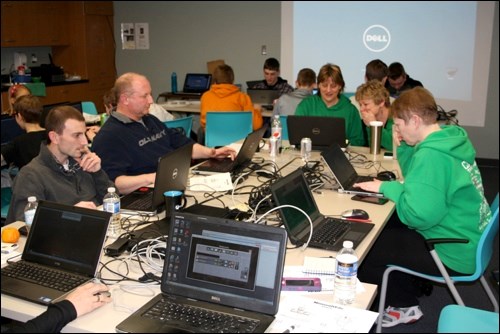Effective teaching and learning can closely resemble play, especially in today’s digital environment.
A group of students from Grade 2 to Grade 10 recently gathered at Living Sky School Division’s workshop room to play a game called Minecraft, responding to situations created by their teachers and learning in the process.
The teachers were learning as well, gaining from the advanced gaming skills of their students.
Minecraft is a game about placing and breaking blocks. At first, people build structures to protect against nocturnal monsters. As the game grows players work together to create imaginative strategies, which are sometimes scary and sometimes pretty.
Naturally, students are highly motivated, and more aware of the fun they are having than the valuable knowledge and skills they are developing.
Learning Consultant Donna DesRoches says students must work together to respond to the tasks the teacher set up in the game, developing skills in both problem solving and collaboration.
Assessment Coach Shawn Whyte explains how setting up game questions that don’t have simple or clear answers draws on the creativity of the entire group to respond.
Mark Strendin from the Information Communication Systems Department provided the technical support for the project team.
The seven teachers from around the school division who participated were impressed with how engaged the students were in the process. Even students who don’t always get along in school worked well together in this virtual world, one teacher remarked. Another noted all her students were collaborating on finding a solution, whether they were the most or least successful academically.
Another observation was students continued to work diligently on the project, even when their teachers left for a few minutes to conference in an adjacent room.
Students reacted in much the same way.
They said they were having fun playing the game, and enjoyed the chance to work as a team. They seemed less conscious of the reading, writing, numeric, special and real world collaboration skills they were learning.
Maybe that’s part of what is developing through the Minecraft project, the ability to embed student learning in a gaming environment.
Catalyst teachers will have an opportunity to continue the project with their classrooms given access to a dedicated computer server for the exercise on an ongoing basis.
The catalyst teachers are: Paul Bricker, Kerrobert; Kyle Clark, Unity Public; Cheryl Dyck, Battleford Central; Larissa Matechuk, Hafford Central; Paul Munro, Macklin; Darlene Phillips, Kerrobert; and Morag Riddell, Unity Public.




